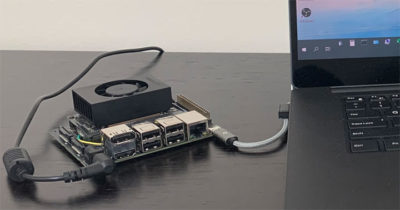Only 846 people in the world hold the title of Woman International Master of chess. Evelyn Zhu, age 15, is one of them.
A rising high school junior in Long Island, outside New York City, Zhu began playing chess competitively at the age of seven and has worked her way up to being one of the top players of her age.
Before COVID-19 limited in-person gatherings, Zhu typically spent two to three hours a day practicing online for an upcoming tournament — if only her laptop could keep up.
Chess engines like Leela Chess Zero — Zhu’s go-to practice partner, which recently beat all others at the 17th season of the Top Chess Engine Championship — use artificial neural network algorithms to mimic the human brain and make moves.
It takes a lot of processing power to take full advantage of such algorithms, so Zhu’s two-year-old laptop would often crash from overheating.
 Zhu turned to the NVIDIA Jetson Xavier NX module to solve the issue. She connected the module to her laptop with a MicroUSB-to-USB cable and launched the engine on it. The engine ran smoothly. She also noted that doing the same with the NVIDIA Jetson AGX Xavier module doubled the speed at which the engine analyzed chess positions.
Zhu turned to the NVIDIA Jetson Xavier NX module to solve the issue. She connected the module to her laptop with a MicroUSB-to-USB cable and launched the engine on it. The engine ran smoothly. She also noted that doing the same with the NVIDIA Jetson AGX Xavier module doubled the speed at which the engine analyzed chess positions.
This solution is game-changing, said Zhu, as running Leela Chess Zero on her laptop allows her to improve her skills even while on the go.
AI-based chess engines allow players like Zhu to perform opening preparation, the process of figuring out new lines of moves to be made during the beginning stage of the game. Engines also help with game analysis, as they point out subtle mistakes that a player makes during gameplay.
Opening New Moves Between Chess and Computer Science
“My favorite thing about chess is the peace that comes from being deep in your thoughts when playing or studying a game,” said Zhu. “And getting to meet friends at various tournaments.”
One of her favorite memories is from the 2020 U.S. Team East Tournament, the last she competed at before the COVID-19 outbreak. Instead of the usual competition where one wins or loses as an individual, this was a tournament where players scored points for their teams by winning individual matches.
Zhu’s squad, comprising three other girls around her age, placed second out of 318 teams of all ages.
“Nobody expected that, especially because we were a young all-girls team,” she said. “It was so memorable.”
Besides chess, Zhu has a passion for computer science and hopes to study it in college.
“What excites me most about CS is that it’s so futuristic,” she said. “It seems like we’re making progress in AI on a daily basis, and I really think that it’s the route to advancing society.”
Working with the Jetson platform has opened up a pathway for Zhu to combine her passions for chess and AI. After she posted online instructions on how she supercharged her crashing laptop with NVIDIA technology, Zhu heard from people all around the world.
Her post even sparked discussion of chess in the context of AI, she said, showing her that there’s a global community interested in the topic.
Find out more about Zhu’s chess and tech endeavors.
Learn more about the Jetson platform.
The post Teen’s Gambit: 15-Year-Old Chess Master Puts Blundering Laptop in Check with Jetson Platform appeared first on The Official NVIDIA Blog.
from The Official NVIDIA Blog https://ift.tt/3hV5Zma
via A.I .Kung Fu

No comments:
Post a Comment